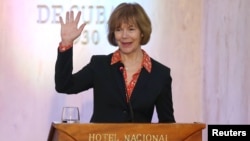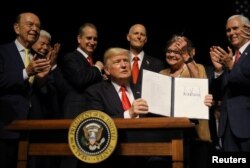Minnesota's government and businesses will continue to engage with Cuba in the areas they can, like agricultural trade, despite U.S. President Donald Trump's partial rollback of the detente, Lieutenant Governor Tina Smith said on Thursday.
The first U.S. state representative to make an official visit to Communist-run Cuba since Trump's announcement on Friday, Smith said authorities there were worried about the setback to bilateral relations.
Leading a bipartisan trade delegation from Minnesota, she said she was therefore glad to carry the message that there was still plenty of support for continuing to normalize relations.
"There is no denying the actions Trump took last Friday are a real setback," Smith, a Democrat, said in an interview in the gardens of Havana's iconic Hotel Nacional. "But the important thing to me is that there is bipartisan support at the federal level for normalizing and modernizing our relationship."
U.S. Sen. Amy Klobuchar, a Minnesota Democrat, in May led a bipartisan coalition of lawmakers, including Republican Sen. Jeff Flake of Arizona, to introduce legislation to lift the U.S. trade embargo on Cuba.
Minnesota is one of the largest U.S. farming states, and Smith's delegation included its agriculture commissioner and the head of its corn growers association. The delegation hopes to improve ties with and promote exports to Cuba.
U.S. farm groups have been particularly critical of the decision by Trump, a Republican, to retreat from Democratic predecessor Barack Obama's opening toward Cuba, saying it could derail huge growth in agricultural exports that totaled $221 million last year.
U.S. law exempts food from a decades-old embargo on U.S. trade with Cuba, although cumbersome rules on executing transactions have made deals difficult and costly.
While Trump's new Cuba policy does not directly target agriculture, it damages improved relations, the farm groups say.
Trump ordered tighter restrictions on Americans traveling to Cuba and a clampdown on U.S. business dealings with the island's military, which manages much of the economy.
The Minnesota delegation met this week with officials of the Cuban ministries of foreign affairs and agriculture, while also visiting a cooperative and local food markets.
But the tour did not include the usual trip to the Mariel port and special development zone, which Cuba hopes will attract foreign investment and become a major shipping hub in the Caribbean. It is controlled by a military-affiliated company.
"In Minnesota we don't have a lot of cocoa or coffee or pineapples, but we do have a lot of corn and beans," Smith said. "We need each others' products."
Cuba invited the Minnesota delegation to a trade show later in the year, Smith said, while Minnesota invited Cuban officials to visit.
"I am very hopeful all of those things will lead us to a place where we can move forward."






